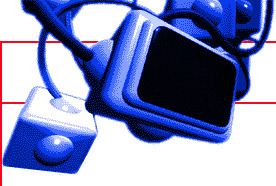|
EXPLORING MARS
Using Mars in a Teaching Plan
This area of the Web site is for teachers and those preparing lesson plans. It is our intention to provide enough material in enough subject areas to keep a class occupied for up to a whole term on a major project with "Exploring Mars" as its theme. That is not to say that this is how you should use the site, you may wish simply to pick something for a single lesson. That can be done too.
The material on the Web Site is aimed at the age-band 8 to 14 years, though some of the information given is perhaps at the level university graduates are studying! We do not apologise for this. You should realise already that many students in this age band are capable of grasping the ideas, concepts and knowledge that is presented here. We do not see it as our task to educate to the minimum standard but to the maximum that individuals are willing, indeed eager, to accept. Look around and you will find some teenagers within this age band whose knowledge and understanding are already beyond that which our Site can teach! They may be exceptions, but don't underestimate the ability of the average student to rise to the occasion when offered the chance.
The approach we have taken is one of learning by investigation, closely backed by learning by using the imagination. We hope that we can spark initiative by links between what at first sight miht seem unrelated topics. These leaps of imagination and apparently unrelated connections are the cornerstomnes of original thought and the entrance to becoming a "thinker". By encouraging this lateral thinker's approach we hope that those who become involved in the projects will be able to make the necessary leaps in thought that have changed our world for the better, in the past.
The procedure sections generally explains the suggested method of performing the experiments, tasks or investigations. None of this is prescriptive, and there is plenty of scope for the modules to be modified to suit individual needs and circumstances. The content of the projects is designed to be achieveable using classroom "junk" materials, and materials available in the home. Photographs of various projects are provided as reference points.
The authors hope that you will find the projects helpful and useful, and will be pleased to hear suggestions for improvements or inclusions.
WHAT CAN BE TAUGHT
The teaching goals and projects, however, are aimed very much towards the 8 to 14 year-olds; and the subjects covered include:
- Geography and geology
- Physics, chemistry and life sciences
- History and cultural studies
- Art and craft, music
- Design and technology
- Research and library skills
- Language
- Information technology
- Life skills
- Presentation skills
WHY MARS?
Space appeals to children but it might seem too vast and unreachable. Mars, however maintains the mystery and excitement, but offers accessibilty with the current exploration taking place. It is also evocative in human history. It has obvious connotations of conflict in many societies and it is the home of the original threatening space-alien, as epitomised by H G Wells and others. So Mars catches the attention. It conjures up excitement, mystery and perhaps a little fear, all of which appeal to children. Mars motivates, so take the opportunity to use it to teach.... whatever you want!
The exploration of another planet, be it manned or unmanned, is an exciting project. It stretches our imagination, and, paradoxically, enables us to better understand our own world. Of all the planets, Mars is, after the Moon, the only body capable of receiving human visitors in the foreseeable future. Mars has also played a crucial role in the history of human cultural and scientific development. Had Mars' orbit been more nearly circular, then Kepler would probably not have formulated his laws of planetary motion when he did, which would have delayed Newton's Laws of Motion. Added to which, Mars' fictional inhabitants have engendered countless novels and films of varying quality, and have - in part at least - driven the search for life on its surface.
The modules and activities presented here are offered as stimuli to class discussion and projects. Each module deals with one specific aspect of the Exploration of Mars, from discussing the problems associated with the design of a probe, to the landing and sucessful functioning of the probe on the surface. The modules represent a sequence of projects, which dovetail into one another, but they can stand alone as individual tasks. Behind them all is the idea that the children should be encouraged to think about Earth as a functioning world, by making active, informed comparisons with Mars. One module asks them to imagine that they themselves are aliens - perhaps Martians - who are trying to find out about life on Earth, and are asked to design a probe to gather data.
HOW TO USE MARS AS A SUBJECT CENTRE
There are a number of approaches teachers may take in using Mars as a subject centre and we expect teachers to adapt them to their own personal preferences and for local conditions or requirements. After all, these pages are for the World, and we are very aware that education systems in various countries are vastly different. Similarly, cultural approaches to the subject may vary.
We have divided our teaching on Mars into nine topics. You may wish to consider Mars from a single aspect within such an area, or you may want to take a cross-curricula approach. If you take the latter path you will find it very rewarding, because Mars has much to offer in places other topics seldom reach!
Following the links to the primary topics will lead you to a factual essay, which will give you a brief background to an aspect of Martian study. This is entitled Fact-pak. This grounding will be sufficient for you to lay out your specific lesson plan and approach, but you may need to do further research and gain a deeper understanding of the subject, if you are not already familiar with it..
The following section is entitled Action-pak. This outlines teaching goals and programmes, with specific ideas for projects and how they might be realised. An overview of what you might expect to achieve in your teaching plan is given. The scope of some projects is wide and long enough to be developed into term-long or multi-week teaching programmes. Others can be considered as self-contained elements in such programmes, or may be run as a single lesson or event.
Finally, there are Fact-pak pages of definitions and links where further information may be obtained.
The teacher's area of the site is linked at each Fact-pak and Action-pak to an appropiate point in the children's area of the site. You may wish to look at these areas too, for they contain additional material.
We also suggest you take a close look at the children's site, as this has much fascinating information and some useful little projects that are easy to organise, safe to do and reasonably cheap to undertake.
NOMENCLATURE AND UNITS
The Site uses as far as possible the mathematical conventions of the SI System, which has been adopted by over 90% of countries. In many cases, figures and values are also given in non-SI units, but these should be considered as approximate conversions and not true values.
Click here to return to the Exploring Mars Lessons Index
|





